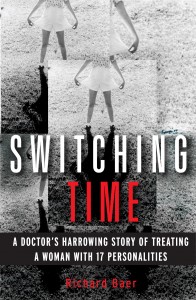 By Jae-Ha Kim
By Jae-Ha Kim
Chicago Sun-Times
December 23, 2007
When Karen Underhill entered his office 18 years ago, psychiatrist Richard Baer had no idea that his troubled patient would become the subject of his debut book, Switching Time.
Karen Underhill (not her real name) was depressed, suicidal and reticent to open up to him in their initial meeting. But as the two met on a regular basis for her therapy sessions, Baer slowly uncovered a woman who had been abused for so long, and by so many different people (her father, grandfather, husband), that she protected herself with a layer of 17 different personalities.
About 18 months into their therapy sessions — which spanned 17 years — Baer realized Karen was suffering from multiple personality disorder. But because he didn’t want to plant any ideas in her head, he kept quiet until she allowed him to meet her other personalities, which included both sexes, children, adults and various races.
“It’s not like television where a therapist will diagnose a patient with MPD immediately and treatment starts,” says Baer, an Oak Park native who resides in Chicago’s Old Town neighborhood. “Most MPD patients hide their disorders very well. They do realize they have issues other people don’t seem to have, but they become very adept at functioning and dealing with things without letting others know. And because many of them have been hurt by authority figures, they don’t automatically want to reveal everything.”
Karen would tell him about losing track of time for long periods of time, but she had no clue how many personalities were at odds in her body. She would tell him about blacking out (at her wedding, for instance), or having a stranger call her by a different name at the grocery store and not having a clue what was going on. She became adept at having conversations with people and squirreling away facts about herself from those conversations.
“For the first two or three years of her treatment, we dealt with her continually being suicidal,” says Baer, 55. “I had to wait until she brought up the possibility of having multiple personalities because I wanted her to be ready to handle it. For me to have brought this up too early would’ve sent her over the edge.”
Karen’s story is sad and shocking, with memories of her father and grandfather raping her, while her mother pretended nothing was happening. She also says she was tortured and molested during cult rituals attended by her grandfather and father, as well as a priest, funeral director, police officer and other neighbors. She remembers her father bullying one of his employees to watch porn at their house, and then waking her up to have sex with his colleague. When the shocked man demurred, Karen’s dad told him she was dirty and enjoyed it. She was 11 at the time.
The stories are so incredible they sometimes sound made up. But Baer points out that Karen was so consistent in her memories that he doesn’t believe her stories were concocted.
Baer worked on Switching Time over the past six years, with much input from Karen, who provided him with journal entries, drawings and letters she had written. Because their relationship changed from patient-client to collaborators, Karen benefits financially from book sales and Baer no longer treats her.
“Karen is doing remarkably well,” he says. “She’s left the abusive husband, she’s raising her children and she has a nice job. We talk at least once a week and get together on occasion. But we formally terminated treatment in the summer of 2006, because there would’ve been a conflict of interest going from a therapy relationship to a financial one.”
Baer, who earned a master’s degree in creative nonfiction at Northwestern University, has his second book in mind.
“People tend to repeat patterns in their relationships and then wonder why they keep ending up with the same type of person,” he says. “I’d like to write about that, and help people break out of that habit. That’s what I think will be next on my agenda.”